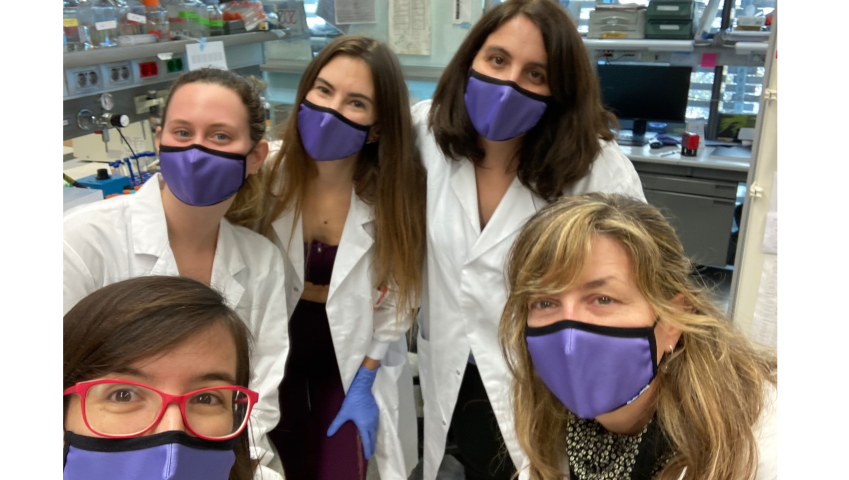


Cancer molecular targets


The laboratory led by Pilar Navarro is focused on the molecular mechanisms driving cancer onset and progression, with particular emphasis in pancreatic cancer. This tumor, in particular pancreatic ductal adenocarcinoma (PDAC), is the third-leading cause of cancer-related death in the developed countries and it is one of the most aggressive human tumors. The 5-year patient survival is less than 3%. Currently, there is no useful therapy for this highly malignant tumor and identification of novel molecular targets is an urgent need. Our group has pioneered several research lines to increase the knowledge about the molecular mechanisms underlying tumor progression and the relevance of tumor-stroma crosstalk in this pathology. Moreover, considering that cancer is a genetic disease caused by changes in gene expression during malignant transformation, we are also very interested in deciphering how these genetic changes are regulated.
Our group belongs to the Associated Unit IIBB-IMIM (June 2018-present), a collaboration between IIBB and the Unit "Molecular Mechanisms of tumorigenesis and tumor progression” of IMIM-Hospital del Mar ( https://www.imim.cat/programesrecerca/cancer/es_dianes_moleculars_cancer.html )
Our current objectives are focused in two main research lines:
1) Identification of Galectin-1 as a new target for cancer diagnosis and therapy
Previous data from our group identified the molecular mechanisms responsible for the pathological and pro-tumoral effects of tissue-plasminogen activator (tPA), a serin-protease that is overexpressed in several solid tumors (Roda et al. Gastroenterology 2009), leading to the identification for the first time of Galectin-1 as a tPA receptor. Our further studies, using genetically engineered mouse models mimicking cancer progression and Galectin-1 (Gal-1) knockout
mice, provided in vivo data supporting a key role for Galectin-1 in promoting pancreatic carcinogenesis and progression through activation of tumor-microenvironment crosstalk. In particular, Gal-1 favours key steps of cancer progression, as proliferation, angiogenesis, desmoplasia, immune evasion and metaplasia (Martinez-Bosch et al. Cancer Res. 2014; Martinez-Bosch & Navarro, Oncoimmunology 2014; Orozco et al. PNAS 2018). Our current research aims to translate our preclinical results into the clinic using different strategies. First, in collaboration with oncologists and pathologist from Hospital del Mar we are performing retrospective and prospective studies to analyze the use of Gal-1 as a new biomarker for cancer diagnosis and/or predictor of therapy response (Martinez-Bosch et al. Oncotarget 2018). Second, our project would enable the development of Gal-1 based new therapeutic intervention strategies against cancer by generation of Gal-1 pharmacological inhibitors. Last but not least, given Gal1 overexpression in many different tumors, our data have broader implications in the use of this protein as a novel molecular target for all those tumors where this protein is overexpressed.
2) Establishment of a novel mechanism of regulation of gene expression in cancer (and other pathologies) by RNA translational control
Mounting recent studies have shown that gene expression control goes much further than transcriptional DNA regulation. In particular, RNA translation emerges as a new molecular mechanism responsible for changes in gene expression during cell malignant transformation. CPEB (Cytoplasmic Polyadenylation Element Binding proteins) family are RNA binding proteins that mediate regulation of RNA translation by 3’UTR elongation of the polyA tail. Our group has shown that a member of this family, CPEB4, is involved in the cellular reprogramming associated to cancer progression, through activation of RNA translation of a high number of protumoral genes (Ortiz-Zapater et al. Nat Med. 2012)). More recently, we have also demonstrated that the DEAD-box helicase DDX6, localized in P-bodies and stress granules, mediates a novel mechanism of translational control involving RNA structures within coding sequences that is alsoconserved in cancer (Jungfleisch et al. Genome Res. 2017). These research projects are currently underway in my group to add further insights into this new level to control aberrant gene expression in cancer.
Follow us on Twitter @PNavarro_Lab !
Join us!
We are seeking to recruit new PhD students to apply for FPU and La Caixa 2021 PhD fellowships. We are also looking for excellent researchers, of any nationality, who wish to develop a junior leadership in our group. Competitive CVs are required to apply for these predocs and postdocs fellowships
Contact:
Web Page:
Mail ⇒ pilar.navarro@iibb.csic.es
Predoctoral fellowships
- FPU (Formación de Profesorado Universitario) 2021
- La Caixa
Postdoctoral fellowships
- La Caixa
- AECC
- CRI Irvington Postdoctoral Fellowship Program
Associated Unit Staff I+D+i IMIM-IIBB/CSIC
- Neus Martinez-Bosch (Postdoctoral Researcher
- Luis Barranco (Clinical Researcher)
- Gemma Mancebo (Clinical Researcher)
-
Associated Personnel
